
 |
||||||
|
GAY
FILM REVIEWS BY MICHAEL D. KLEMM
|
||||||
|
Taxi Zum Klo Breaking
Glass Pictures,
Director/Screenplay Starring: Unrated, 98 minutes
|
Leather
And Lederhosen
I am always pleased when an older classic debuts on DVD, especially when it gets the 30th anniversary special edition treatment that it deserves. I have a long history with the groundbreaking 1981 German film, Taxi Zum Klo. In 1982, I was 24 years old and cocooned in the closet. Gay themed films in the movie theaters were virtually non-existent but two movies about being gay played at the same time in Buffalo that year. The first, Making Love, was a mainstream Hollywood release which played at theaters everywhere. The second, Germany's Taxi Zum Klo, was screened at the old Allendale Theatre when it was still a foreign film house. Making Love, ground-breaking as it was, treated its subject with kid gloves, while Taxi Zum Klo, unfettered by studio restraints, emerged as a truly radical movie. |
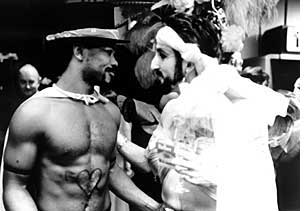 A
favorable review in the late, lamented Courier Express perked my
interest but the description of the plot scared me off. Still struggling
with my sexuality at that point, the film sounded like it might be my worst
nightmare. I was hung up on "masculinity" issues and the picture of a bearded
man wearing a dress did nothing to assuage my fears. I was also still reeling
from my experience at Making Love because the audience had screamed
and laughed throughout the film. I would regret my decision for a long time;
I did not see Taxi Zum Klo until
ten years later when I finally found a copy for rent at a local indie video
store that specialized in hard-to-find foreign titles (the also late, lamented
Mondo Video). Films like this were anathema to Blockbuster Video back then. A
favorable review in the late, lamented Courier Express perked my
interest but the description of the plot scared me off. Still struggling
with my sexuality at that point, the film sounded like it might be my worst
nightmare. I was hung up on "masculinity" issues and the picture of a bearded
man wearing a dress did nothing to assuage my fears. I was also still reeling
from my experience at Making Love because the audience had screamed
and laughed throughout the film. I would regret my decision for a long time;
I did not see Taxi Zum Klo until
ten years later when I finally found a copy for rent at a local indie video
store that specialized in hard-to-find foreign titles (the also late, lamented
Mondo Video). Films like this were anathema to Blockbuster Video back then. |
|
|
|
|
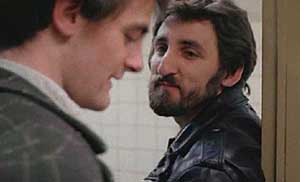 Frank,
also known in the film as "Peggy," is a school teacher in Berlin, Germany.
He is also an amateur filmmaker. Our first view of Frank is a close-up of
his hairy butt as he wakes up in the morning. Like Charlie Chaplin and Buster
Keaton, Ripploh endears his character to the audience through a time honored
tradition: slapstick comedy. Naked, he strolls out of his apartment to steal
his neighbor's newspaper. When he is locked out, he is forced to knock on
his neighbor's door and then climb, still naked, across his balcony to get
back home. On the way to school, he cruises a gas station attendant and
writes down his phone number in one of his student's dictation books. After
school, he grades his pupils' papers as he sits in a public toilet while
a man in the next stall offers him his penis through a glory hole. While
driving home he thinks about the Chilean Solidarity Meeting he was supposed
to attend and decides to go to the baths instead. Frank,
also known in the film as "Peggy," is a school teacher in Berlin, Germany.
He is also an amateur filmmaker. Our first view of Frank is a close-up of
his hairy butt as he wakes up in the morning. Like Charlie Chaplin and Buster
Keaton, Ripploh endears his character to the audience through a time honored
tradition: slapstick comedy. Naked, he strolls out of his apartment to steal
his neighbor's newspaper. When he is locked out, he is forced to knock on
his neighbor's door and then climb, still naked, across his balcony to get
back home. On the way to school, he cruises a gas station attendant and
writes down his phone number in one of his student's dictation books. After
school, he grades his pupils' papers as he sits in a public toilet while
a man in the next stall offers him his penis through a glory hole. While
driving home he thinks about the Chilean Solidarity Meeting he was supposed
to attend and decides to go to the baths instead. |
|
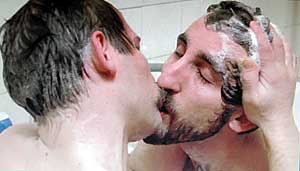 At
a movie theater he meets and falls for Bernd (Ripploh's real-life lover,
Bernd Broaderup). Bernd, who longs for a monogamous relationship, moves
in with Frank. Bernd's presence does nothing to curb Frank's sexual appetite.
He comes home one afternoon to find Frank in bed with some rough trade.
When confronted, Frank says "When I walk down the street it is an adventure
for me. It's my domain and things sometimes happen. I don't want to be Joe
Normal. Next time you join in, understand?" In a later scene, Bernd visits
Frank in the hospital like a dutiful wife. When he leaves, Frank throws
on a robe, hails a taxi, and takes it to a public toilet for a quickie. At
a movie theater he meets and falls for Bernd (Ripploh's real-life lover,
Bernd Broaderup). Bernd, who longs for a monogamous relationship, moves
in with Frank. Bernd's presence does nothing to curb Frank's sexual appetite.
He comes home one afternoon to find Frank in bed with some rough trade.
When confronted, Frank says "When I walk down the street it is an adventure
for me. It's my domain and things sometimes happen. I don't want to be Joe
Normal. Next time you join in, understand?" In a later scene, Bernd visits
Frank in the hospital like a dutiful wife. When he leaves, Frank throws
on a robe, hails a taxi, and takes it to a public toilet for a quickie. |
|
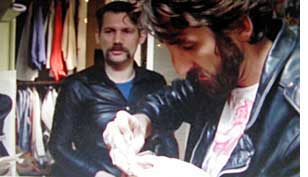 Despite
his overactive libido, Frank does love Bernd. "When I'm old, will I still
be so restless?" he asks himself. "I'm afraid of becoming some old fag who
hangs around urinals." While he seems heartless at times, other scenes show
him visiting his mother, helping a battered woman who shows up at his doorstop,
and bowling with his fellow teachers. His stormy relationship with Bernd
isn't defined entirely in sexual terms. They experience the same problems
as any couple might. Frank wants to live in the city, Bernd in the country
on a farm. Bernd gets angry when Frank doesn't eat the dinner that he just
cooked for him. When Frank flirts with a young man at a costume ball, Bernd
reacts as any devoted but ignored spouse would. Despite
his overactive libido, Frank does love Bernd. "When I'm old, will I still
be so restless?" he asks himself. "I'm afraid of becoming some old fag who
hangs around urinals." While he seems heartless at times, other scenes show
him visiting his mother, helping a battered woman who shows up at his doorstop,
and bowling with his fellow teachers. His stormy relationship with Bernd
isn't defined entirely in sexual terms. They experience the same problems
as any couple might. Frank wants to live in the city, Bernd in the country
on a farm. Bernd gets angry when Frank doesn't eat the dinner that he just
cooked for him. When Frank flirts with a young man at a costume ball, Bernd
reacts as any devoted but ignored spouse would. |
|
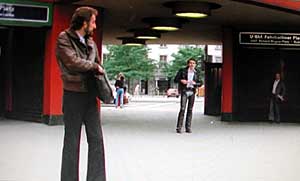 Making
Love attempted to sanitize homosexuality for a mass audience. Taxi
Zum Klo, on the other hand, is almost a celebration of pre-AIDS
promiscuity. Unbound by the Hollywood restraints that Making Love's screenwriter
surely faced, Ripploh was able to present his uncensored vision on celluloid.
Ripploh is hardly a role model, nevertheless his portrayal is an honest
and refreshing one. Frank grows marijuana, drops acid, snorts cocaine, and
seizes any opportunity to engage in fast sex. While Making Love shocked
audiences with a male-to-male kiss and a short embrace in bed, Taxi
Zum Klo's sex scenes are almost as explicit as a porn flick.
A lot of the sex is also quite kinky. There are a close-ups of oral sex,
there's leather and a bit of S&M. There's even a golden shower! Making
Love attempted to sanitize homosexuality for a mass audience. Taxi
Zum Klo, on the other hand, is almost a celebration of pre-AIDS
promiscuity. Unbound by the Hollywood restraints that Making Love's screenwriter
surely faced, Ripploh was able to present his uncensored vision on celluloid.
Ripploh is hardly a role model, nevertheless his portrayal is an honest
and refreshing one. Frank grows marijuana, drops acid, snorts cocaine, and
seizes any opportunity to engage in fast sex. While Making Love shocked
audiences with a male-to-male kiss and a short embrace in bed, Taxi
Zum Klo's sex scenes are almost as explicit as a porn flick.
A lot of the sex is also quite kinky. There are a close-ups of oral sex,
there's leather and a bit of S&M. There's even a golden shower! |
|
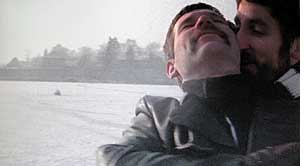 As
cinema, Taxi Zum Klo is hardly
perfect. Its low budget is apparent but this is not a flaw. There are a
few clever visual nods to classic films, Cabaret for one. Occasionally
Ripploh cuts in old, scratchy, footage of "blue movies" to mock the action
onscreen. There is a spontaneity to the movie that is as infectious as the
early works of Godard and Truffaut. The characters' lives are aimless, and
Ripploh allows the camera to meander from one episode to the next, documenting
the more "carefree" days that existed before the AIDS crisis. For all its
daring, one never gets the impression that Ripploh is out to shock his audience.
He simply presents his life as it is and makes no bones about it. Instead,
he merely explains during the opening voice-over that he is a "normal, tired,
neurotic, polymorphous perverse teacher." As
cinema, Taxi Zum Klo is hardly
perfect. Its low budget is apparent but this is not a flaw. There are a
few clever visual nods to classic films, Cabaret for one. Occasionally
Ripploh cuts in old, scratchy, footage of "blue movies" to mock the action
onscreen. There is a spontaneity to the movie that is as infectious as the
early works of Godard and Truffaut. The characters' lives are aimless, and
Ripploh allows the camera to meander from one episode to the next, documenting
the more "carefree" days that existed before the AIDS crisis. For all its
daring, one never gets the impression that Ripploh is out to shock his audience.
He simply presents his life as it is and makes no bones about it. Instead,
he merely explains during the opening voice-over that he is a "normal, tired,
neurotic, polymorphous perverse teacher." |
|
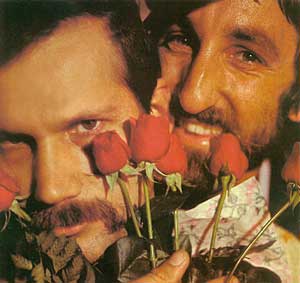 There
is a cute cartoon reproduced in Vito Russo's The Celluloid Closet
that shows two men reading a film magazine. "Listen to this," one says,
"Taxi Zum Klo outgrosses Ordinary
People!" The other disbelieves him and reads it too. It really
says "Taxi Zum Klo grosses out
ordinary people." I'm sure it did and that is why I commend the film's sublime
anarchy and tip my hat to the director for his cajones. The film was a true
original. Sentimentality goes out the window when we see Frank pissing a
heart in the snow to show his love for Bernd. Their requisite cute montage
sequence looks more like The Beatles romping in that playground in A
Hard Day's Night than it does Love Story. For all its outrageousness,
the film also never forgets to be dramatic. The ending is actually pretty
heavy. There
is a cute cartoon reproduced in Vito Russo's The Celluloid Closet
that shows two men reading a film magazine. "Listen to this," one says,
"Taxi Zum Klo outgrosses Ordinary
People!" The other disbelieves him and reads it too. It really
says "Taxi Zum Klo grosses out
ordinary people." I'm sure it did and that is why I commend the film's sublime
anarchy and tip my hat to the director for his cajones. The film was a true
original. Sentimentality goes out the window when we see Frank pissing a
heart in the snow to show his love for Bernd. Their requisite cute montage
sequence looks more like The Beatles romping in that playground in A
Hard Day's Night than it does Love Story. For all its outrageousness,
the film also never forgets to be dramatic. The ending is actually pretty
heavy. |
|
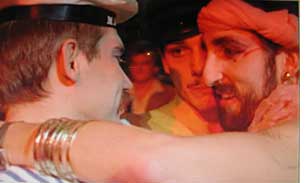 I
couldn't help noticing that this film shares something with a few of the
other early groundbreakers. Like 1974's A
Very Natural Thing and 1978's Nighthawks,
Taxi Zum Klo features a protagonist
who is a school teacher. The 1989 Berlin film Coming
Out would also spotlight a teacher. Taxi
Zum Klo and Nighthawks both follow a promiscuous anti-hero
and each climaxes with a scene in the classroom where the students find
out their teacher is a pouf. I
couldn't help noticing that this film shares something with a few of the
other early groundbreakers. Like 1974's A
Very Natural Thing and 1978's Nighthawks,
Taxi Zum Klo features a protagonist
who is a school teacher. The 1989 Berlin film Coming
Out would also spotlight a teacher. Taxi
Zum Klo and Nighthawks both follow a promiscuous anti-hero
and each climaxes with a scene in the classroom where the students find
out their teacher is a pouf. |
|
|
Taxi Zum Klo broke new ground and remains one of queer cinema's most important titles. It helped pave the way for a new wave of independent films that eventually led to the current era of gay treatments (both good and bad) in mainstream movies. |
|
|
While
googling Ripploh's name, I discovered that he also appeared with Fassbinder
in Kamikaze 89 and
as Peggy von Schnottgenberg in two of his fellow countryman Rosa
Von Praunheim's films, Axel von Auersperg
(1974) and Monolog
Eines Stars (1975.) |
|
| The restored
DVD is available from Breaking Glass Pictures and be ordered by clicking
here: Breakingglasspictures.com |